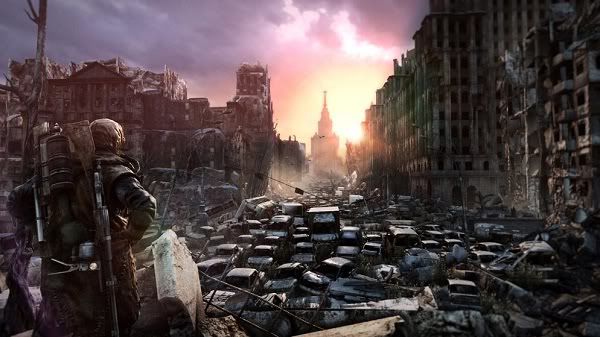
The urban wasteland of Moscow harbors a hidden reflection of humanity.
But Metro 2033 protagonist Artyom doesn't have time for philosophical ruminations. He's got his hands full dodging the dangers found beneath the irradiated streets of a city that once housed over 11 million people. His explorations intertwine with other encountered survivors struggling to see another full turn of the clock.
Yet Artyom's journey also signifies a pivotal ethical concept latent in most post-apocalyptic games: the condition of mankind devoid of society's structured security.
Let's jump back 360 years. Thomas Hobbes, a 17th century English political theorist, advanced an argument named the “state of nature.” Essentially, Hobbes believed humankind sans society was the norm for a “nasty, brutish, and short” lifestyle. He further postulated that only a common power (such as laws and governments) keeps our primal tendencies in check. Without control, we'd be at each other's necks in no time.

Metro 2033 and similar games of its ilk clearly depict the state of nature in various forms. A crucial element of Hobbes' theorem is that restraint flies out the window when preserving your life. Anything and everything goes.
While the moral choices of Metro aren't as apparent as, say, Fallout 3, you discover that sticking your neck out for someone else isn't so safe as keeping your mouth shut and your gun holstered. Missions start in “civilized” shantytowns dotting Moscow's murky subway system. Things take a savage turn once you step beyond that last rust-ridden door into the inky blackness.
Choice factors even less in BioShock, but the state of nature runs just as strongly. After a bloody upheaval that leaves any semblance of order in tatters, Rapture's once-upstanding inhabitants turn feral. As Jack, players heed Atlas' urging of escape coupled with a push for restoring civility to the troubled city – an echo of Hobbes' acknowledgment that even in the primordial face of lawlessness, “every man ought to endeavor peace, as far as he has hope obtaining it.”

Rapture's leaking hallways brim with chaos. The only stable and safe haven for Jack is the labs of Dr. Tenenbaum which provide some tranquility.
These games exemplify how the state of nature exemplifies civilization as the optimal outcome over entropy. The remnants of Metro's smashed Moscow populace cling to the societal rules they once embraced while in the midst of monstrosity. BioShock's gene-splicing citizens are walking examples of humanity's rapid reversion to basic instincts after an authority figure disappears.
The state of nature paints a world in which our only saving grace is civilization…but games gives us that world to live in.


